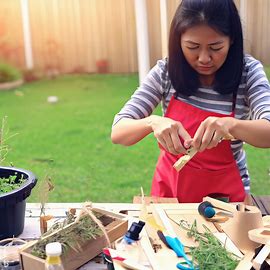
Introduction to DIY Projects
'Do-It-Yourself' or DIY, as it's commonly called, is more than just a hobby; it's a skill, a creative outlet, and a fantastic way to save money.
From home improvement projects to craft projects, the realm of DIY is vast and varied.
The popularity of DIY has soared in recent years, with more and more people looking to repurpose items, upcycle and take on home renovation tasks independently.
Essential DIY Skills
Starting your journey into DIY projects begins with mastering some essential DIY skills.
These skills range from simple tasks like hammering nails, and painting walls, to more advanced skills such as woodworking and basic wiring.
No matter the project at hand, understanding these techniques helps you create quality work and ensures you're capable of fixing any minor mishaps around your home.
Basic Tools for DIY
In the DIY world, the saying "the right tool for the right job" rings very true.
Basic hand tools like hammers, screwdrivers, and wrenches are given.
Power tools, such as drills and saws, might also be necessary, depending on your project.
It's crucial to invest in good quality tools to ensure safety and efficiency.
Safety Measures
Safety is paramount in DIY projects.
Whether you're working with hand tools or power tools, always follow the manufacturer's instructions and use protective equipment like safety glasses, gloves, and sturdy footwear.
Proper ventilation is also essential, particularly when painting or working with solvents.
Starting Your First Project
Beginning your first DIY project can be exhilarating.
Start with a simple task that requires minimal tools and materials to get a feel for the work involved.
Consider something like assembling a bookshelf or painting a room. These projects provide valuable experience and a great sense of accomplishment.
Common DIY Mistakes and How to Avoid Them
Every DIY enthusiast will tell you that mistakes are part of the process.
Over-ambition, lack of proper project planning, ignoring safety measures, and not following DIY instructions are some of the common pitfalls.
It's essential to understand these potential challenges and prepare accordingly. Read up on tutorials, and don't shy away from seeking help from the vast DIY community available online.
DIY Project Ideas
From home décor crafts to complete room makeovers, there's no shortage of DIY project ideas.
Whether you're a beginner looking for a simple task or an advanced DIYer ready for a new challenge, the internet is brimming with inspiration.
Just remember to start at a comfortable level and gradually move on to more complex projects as you build confidence and skills.
Cost-saving Tips for DIY
One of the significant benefits of DIY is the potential for cost savings.
This involves smart budgeting, sourcing affordable DIY materials, and finding ingenious ways to repurpose items.
Upcycling, for example, not only saves you money but also allows for creativity and reduces waste.
DIY Resources
As you delve deeper into DIY, a variety of resources become indispensable.
DIY tutorials, whether online blogs, YouTube channels, or even traditional DIY books, are invaluable for learning new skills and techniques.
Online DIY communities can offer advice, provide feedback, and even inspire your next project.
The world of DIY is as exciting as it is vast. By starting with the basics, building your skills, and taking on projects that truly inspire you, you'll be well on your way to becoming a proficient DIY enthusiast.
Remember, the journey of DIY is one of learning and creativity, and there's no end to what you can achieve with patience, practice, and the right tools.
Understanding Your Project
In the domain of DIY, understanding your project is key to success.
Many beginners make the mistake of diving headfirst into a project without fully grasping its requirements.
Do some research, make a list of necessary tools and materials, understand the skills you'll need, and create a step-by-step guide for your project.
Proper project planning at the start saves you time and trouble later on.
Basic DIY Techniques
There's a wide range of DIY techniques that can come in handy, from basic painting tips to more complex skills such as drilling, sanding, or even simple carpentry.
Online tutorials can be invaluable here, offering step-by-step instructions and visual guides.
However, nothing beats practical experience, so don't be afraid to practice new techniques on scrap materials before starting your actual project.
Tackling Home Renovations
Home renovation can seem like a daunting task, but with a bit of DIY spirit, you can transform your space without hiring professionals.
Basic DIY skills can be applied to a variety of home improvement tasks, such as installing shelves, replacing doorknobs, fixing leaky faucets, or even building your own furniture.
However, remember that some tasks should always be left to professionals, especially ones that involve complex plumbing, electrical work, or structural changes.
Advanced DIY
Once you've mastered the basics and completed a few projects, you might feel ready to tackle more advanced DIY.
This could involve larger, more complex projects such as building furniture from scratch, installing a new bathroom vanity, or even renovating an entire room.
These projects will require a higher level of skill, more advanced tools, and more thorough planning, but the satisfaction of completing a major DIY project is well worth the effort.
Conclusion
DIY offers an exciting world of creativity, learning, and personal achievement.
By starting with the basics and gradually building up your skills and knowledge, you can accomplish projects you might never have thought possible.
Whether you're painting a room, building a bookshelf, or even renovating an entire space, DIY gives you the power to shape your environment and make your mark.
With a little patience and a lot of enthusiasm, anyone can become a skilled DIY enthusiast. So why not start your DIY journey today?
